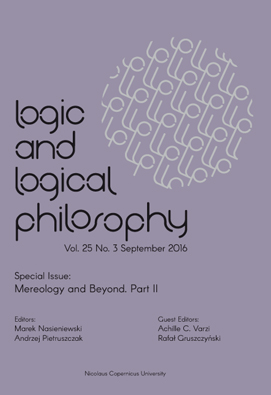Set-theoretic mereology
DOI:
https://doi.org/10.12775/LLP.2016.007Keywords
mereology, set theory, foundations of mathematicsAbstract
We consider a set-theoretic version of mereology based on the inclusion relation ⊆ and analyze how well it might serve as a foundation of mathematics. After establishing the non-definability of ∈ from ⊆, we identify the natural axioms for ⊆-based mereology, which constitute a finitely axiomatizable, complete, decidable theory. Ultimately, for these reasons, we conclude that this form of set-theoretic mereology cannot by itself serve as a foundation of mathematics. Meanwhile, augmented forms of set-theoretic mereology, such as that obtained by adding the singleton operator, are foundationally robust.References
A. Baudisch, D. Seese, P. Tuschik, and M. Weese, “Decidability and quantifier-elimination”, pages 235–270 in Model-theoretic logics, Perspect. Math. Logic, Springer, New York, 1985.
L. Champollion and M. Krifka, “Mereology”, in Cambridge Handbook of Semantics, P. Dekker and M. Aloni (eds.) Cambridge University Press (in press).
C.C. Chang and H.J. Keisler, Model theory, volume 73 of “Studies in Logic and the Foundations of Mathematics”, North-Holland Publishing Co., Amsterdam, third edition, 1990.
Ju.L. Eršov, “Decidability of the elementary theory of relatively complemented lattices and of the theory of filters”, Algebra i Logika Sem., 3 3 (1964): 17–38.
J.D. Hamkins, “Is the inclusion version of Kunen inconsistency theorem true?” MathOverflow answer, 2013. http://mathoverflow.net/a/144236/1946 (accessed 25.04.2016).
G. Hellman, “Mereology in philosophy of mathematics”, preprint available on the author’s web page at http://www.tc.umn.edu/~hellm001/Publications/MereologyandPhilMath.pdf.
W. Hodges, Model Theory, volume 42 of “Encyclopedia of Mathematics and its Applications”, Cambridge University Press, Cambridge, 1993.
A. Kanamori, “The empty set, the singleton, and the ordered pair”, Bull. Symbolic Logic, 9, 3 (2003): 273–298. DOI:10.2178/bsl/1058448674
D. Lewis, Parts of Classes, Blackwell, 1991.
J.D. Monk, Mathematical Logic, Springer-Verlag, New York–Heidelberg, 1976. Graduate Texts in Mathematics, No. 37.
B. Poizat, A Course in Model Theory, Universitext, Springer-Verlag, New York, 2000. An introduction to contemporary mathematical logic, Translated from the French by Moses Klein and revised by the author.
A. Varzi, “Mereology”, in The Stanford Encyclopedia of Philosophy (Spring 2016 Edition), E.N. Zalta (ed.). http://plato.stanford.edu/archives/spr2016/entries/mereology/
M. Weese, “Decidable extensions of the theory of Boolean algebras”, pages 983–1066 in Handbook of Boolean algebras, Vol. 3, North-Holland, Amsterdam, 1989.
Downloads
Published
How to Cite
Issue
Section
Stats
Number of views and downloads: 781
Number of citations: 0







